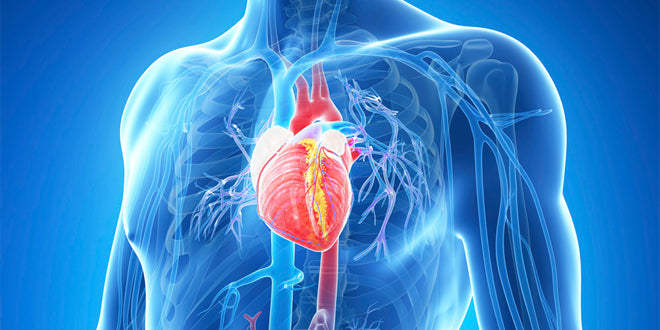Heart disease is the number one killer of Americans but, luckily, it’s completely avoidable with proper diet and exercise.
The heart—quite literally—is at the center of optimal bodily function. Arguably the most important organ in the body, the heart pumps blood and oxygen to every tissue and extracts carbon dioxide and waste. It is totally common sense to assume that it is vital to keep the heart healthy, and yet heart disease remains the primary cause of death in the United States. Internally, heart disease is caused by the thickening of fatty plaque buildup that stiffens artery walls and prevents essential blood flow to other parts of the body. Atherosclerosis is the most common form of the disease, and it is caused primarily by correctable problems, especially:- poor diet
- lack of exercise
- obesity
- smoking
How to Avoid Heart Disease
The fatty plaque buildup that leads to heart disease is caused by foods that are high in fat and sodium and lead to elevated blood pressure and cholesterol: Fats—There are many types of fat in food, and not all of them increase the risk of heart disease. Trans fats are found in margarine, fried food and processed foods to improve flavor, texture and shelf life, and have been linked to heart disease, diabetes and stroke. Saturated fats are commonly found in animal products such as meat, milk and cheese, and are recommended by many so called experts to be less than 10% of daily caloric intake because heart disease risk is so high. Hallelujah Diet recommends zero animal products because they are inherently unhealthy. Conversely, polyunsaturated and monounsaturated fats are found in plant foods like olive oil, peanut oil, canola oil, avocados, nuts and legumes, and all lower risk of heart attack by fighting against blood clotting, sedentary muscles and inflammation. Blood Pressure—High blood pressure can cause numerous health issues: overstretched and injured blood vessel walls; increased risk of heart attack, stroke, heart and kidney failure; and reduced oxygen-rich blood that bodily tissues receive. Overstretched and injured blood vessel walls cause plaque buildup at the damaged sites, and reduce and limit blood flow. Aside from being a major cause of heart disease, high blood pressure can result in plaque buildup breaking off from the heart, traveling to another part of the body and causing a blood clot, which can result in a stroke. Sodium—Unrefined sea salt provides essential sodium and chloride. However, in the form of refined table salt and in the amounts found in processed foods, fast food, chips and many other foods, sodium can be a deadly contributor to heart disease. The recommended maximum amount of daily salt intake is 2,300 milligrams, but the average American consumes 3,600 milligrams. Hidden on packaging labels with names like sodium bicarbonate, baking soda and its chemical name Na, sodium has been directly connected to high blood pressure. Cholesterol—Cholesterol is manufactured in the liver for the production of hormones and cell membranes. There are both LDL (typically considered bad) cholesterol and HDL (good) cholesterol. Much of the plaque buildup that leads to heart disease results from oxidized cholesterol. Oxidized LDL cholesterol is carried to bodily tissues and attaches to arteries, creating a dangerous buildup. In contrast, HDL (good) cholesterol attacks bad cholesterol and removes it from arteries to prevent buildup. LDL cholesterol is commonly found in saturated and trans fats. Specific studies have recently shown that the consumption of animal protein increases the risk of heart disease. One study, led by Stanley Hazen, MD, PhD, shows that a nutrient found in animal protein, carnitine, causes a gut microbe reaction that further develops hardening of arteries. Additionally, animal protein is extremely high in dangerous LDL cholesterol.How Can Exercise Help to Prevent Heart Disease?
Second only to proper diet, exercise is vital in the fight against heart disease. Along with high blood pressure, high cholesterol, smoking and obesity, the American Heart Association cites lack of physical activity as one of the five most direct causes of heart disease. Exercise is particularly effective in fighting heart disease because it can reduce many of the other factors that contribute to plaque buildup. Exercise:- burns calories and reduces obesity
- lowers blood pressure, LDL and total cholesterol
- raises good HDL cholesterol
- promotes blood flow
- improves oxygen intake and usage
Superfoods that Strengthen the Heart
With the odds seemingly stacked in favor of contracting heart disease, you may be wondering: what can I eat to reduce my risk of heart disease? Generally, the proper diet that can help you meet your objective contains high levels of:
- antioxidants
- anti-inflammatory nutrients
- high levels of fiber and plant proteins
Berries—Berries can be especially healthy due to their high levels of antioxidants. Eating a cup of mixed berries daily for eight weeks has been shown to increase HDL cholesterol and lower blood pressure. In a study of 72 middle-age people published in the American Journal of Clinical Nutrition, subjects ate a mix of raspberries, strawberries and bilberries. They showed increased levels of HDL cholesterol and lower blood pressure. Berries’ heart disease fighting properties are largely due to a diverse mix of polyphenols that includes anthocyanins and ellagic acid. Polyphenols have been linked to increased levels of nitric oxide, which helps to relax blood vessels and lower blood pressure.
Takeaways
- Heart disease isn’t the number one killer of Americans for no reason.
- It is a prevalent malady in many adults, but it doesn’t have to be.
- With a healthy diet, plenty of exercise and zero smoking, the risk of contracting heart disease is dramatically diminished.
- To maintain optimal health, it’s important to avoid foods that are high in saturated and trans fats, as well as sodium, because these often lead to high oxidized LDL cholesterol and blood pressure.
- Organic whole grain carbohydrates, beans, nuts and berries contain many nutrients that are essential to fighting the issues that can lead to heart disease.
- Physical activity is always recommended, and even a daily walk can provide enough oxygen flow to protect and strengthen the heart.







